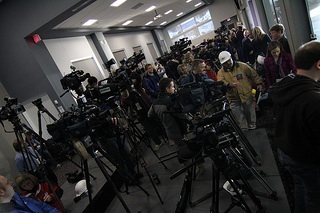Media recruiting: BBC welcomes James Harding with another furore
 It is odd to think of the BBC as a victim of bullying. It is by far the largest and best-funded child in the playground, should be afforded the protection of the headmaster (though it rarely is), and consistently hands in top work. But, of course, in the pathology of the playground, this makes it a natural victim. And the fact that it consistently takes a mea culpa position rather than punching back only makes the problem worse. Come on, Beeb, the circling bullies chant. Have a go if you think you’re hard enough.
It is odd to think of the BBC as a victim of bullying. It is by far the largest and best-funded child in the playground, should be afforded the protection of the headmaster (though it rarely is), and consistently hands in top work. But, of course, in the pathology of the playground, this makes it a natural victim. And the fact that it consistently takes a mea culpa position rather than punching back only makes the problem worse. Come on, Beeb, the circling bullies chant. Have a go if you think you’re hard enough.
Like many victims of bullying, it simply doesn’t know how to respond to such goading. Mostly, it demurs. Occasionally, it tries to bite back. And inevitably this misfires.
So when Ceri Thomas stepped up to say that the students who accompanied John Sweeney on the trip to North Korea had all given their consent, he must have been aware he was likely to be challenged. The BBC’s Today programme didn’t take long to get stuck in; when asked how he could be sure this was the case (students were briefed individually, without witnesses, and signed no consent document) he blustered: it doesn’t matter whether it was done orally or in writing, he said. Because of the lack of evidence, of course, it matters enormously. The corporation’s detractors will pick away at these bones, and there are at least some of the LSE students who are willing to undermine Thomas’s version of events.
So, welcome James Harding, to the playground. Harding proved himself in a pretty tough school, rising to top dog quickly – and much to the surprise of the other high-rankers – and then falling from grace even more rapidly. The reason for his departure from The Times has never been made explicit (or at least cogently explained) but it seems likely that his independent line on Leveson did little to please Murdoch.
The charges that have been levelled against him that he is a relatively cautious journalist, very bright but not willing to go for the killer blow without overwhelming evidence. While considered popular by some journalists, in his early days as Editor of The Times he did surround himself with a coterie of yes-men which alienated many senior team members. He must not make the same mistake at the BBC; to continue the school theme, the politics at the Beeb make News International look like a kindergarten.
However, Auntie could benefit greatly from having a more streetwise head of news, and one who recognises a news story when it falls in their lap. Harding’s record suggests that he would have run the Savile story – though perhaps with caveats – at the first asking. But he will also be sensitive to the kind of unconscious arrogance that the Corporation sometimes displays (the North Korea Panorama being a perfect example) in a way that insiders have clearly not been until now. Perhaps this natural historian’s demand for evidence would have required that the students signed consent forms, to be on the safe side.

After all, he knows how the BBC’s bullies think. He has worked with them for years.
(PS: it is odd that the LSE went public with their complaint. The film took great pains not to show any students of to identify the group, saying only that they were with a touring party. No viewer would have known the source of the touring party. Perhaps the LSE just decided that it was its turn to put the boot in; it is telling that no-one has asked them to justify their actions.)
enquiries@trippassociates.co.uk
Martin Tripp Associates is a London-based executive search consultancy. While we are best-known for our work in the TMT (technology, media, and telecoms) space, we have also worked with some of the world’s biggest brands on challenging senior positions. Feel free to contact us to discuss any of the issues raised in this blog.